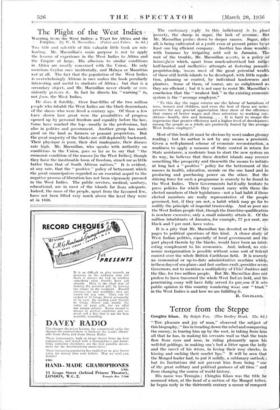The Plight of the West Indies
THE title and sub-title of this valuable little book are mis- leading. Mr. Macmillan's main purpose is not to apply the lessons of experience in the West Indies to Africa and the Empire at large. His allusions to similar conditions in Africa are mostly concerned with the Union. He only mentions Ceylon once incidentally, and Malaya or Mauritius not at all. The fact that the population of the West Indies is overwhelmingly African in race makes the book peculiarly interesting and useful to students of Africa ; but that is a secondary object, and Mr. Macmillan never clearly or con- sistently pursues it. In fact he directs his " warning," to, not from, the West Indies.
He does it forcibly. Over four-fifths of the two million people who inhabit the West Indies are the black descendants of the slaves who were freed a century ago. Of these a few Lave shown how great were the possibilities of progress opened up by personal freedom and equality before the law. Some have reached the top—mostly in the professions, but also in politics and government. Another group has made good on the land as farmers or peasant proprietors. But the great majority of the blacks are still deplorably backward. Their physique is poor, their diet inadequate, their disease rate high. • Mr. Macmillan, who speaks with authority on conditions in the Union, goes so far as to say that " the economic condition of the masses [in the West Indies], though they have the inestimable boon of freedom, struck me as little better than that of South African natives." It is evident, at any rate, that the " positive " policy of betterment which the great emancipators regarded as an essential sequel to the negative process of liberation has not been vigorously pursued in the West Indies. The public services, medical, sanitary, educational, are in most of the islands far from adequate. Indeed, the mass of the people, apart from the favoured few, have not been lifted very much above the level they were at in 1838.
The customary , reply ,to this indictment ,is plead
poverty, the slump in sugar, the lack of revenue, - ant Mr. Macmillan probes down to deeper causes. Sugar, .ater all, is being cultivated at a profit even at present prices by:-at least one big efficient company. Another has done wondc:rs with bananas by irrigating arid soil in Jamaica. The root of the trouble, Mr. Macmillan asserts, is a policy.:Of laissez-faire which, apart from much-advertised but rat half-hearted and ineffective attempts at fostering peasant- proprietorship, leaves most of the great ,potential wealth of these still fertile islands to be developed, with little regula- tion, planning or control, by individual landowners and planters. Sonic of them, of course, are as enlightened :las they are efficient ; but it is not easy to resist Mr. Macmillan's conclusion that the " weakest link " in the existing economic system is the " average employer."
" To this day the sugar estates use the labour of battalions of men, women and children, and even the best of. them are unim- pressive for any general appreciation they show of the efficiency that comes of better wages and close attention to working ben. ditions—health, diet and housing. . . . It is hard to escape the impression that greater efficiency and a higher level of development among the people as a whole are positively feared by the average West Indian employer."
Most of this book (it must be obvious by now) makes gloo9iy reading ; but its author is not by any means a pessimist.
Given a well-planned scheme of economic reconstruction,; a readiness to apply a measure of State control in return for State assistance, a moderate loan to start the new system on its way, he believes that these derelict islands may recover something like prosperity and therewith the means to initiate it long last a positive " policy for the betterment of the masses in health, education, morale on the one hand and in producing and purchasing power on the other. But the driving force for such a programme is scarcely to be found hi the West Indies. Their Governments hal itually hesitate to press policies for which they cannot carry with them . the elected members of their legislatures—not a bad habit if those elected members are really representative of the people governed, but, if they are not, a habit which may go far to nullify the principle of imperial trusteeship. And so poor are the West Indian people that, though the franchise-qualificaticin is nowhere excessive, only a small minority attain it. Of the
million inhabitants of Jamaica, for example, 77 per cent. are
black and 7 per cent. have votes. . , It is a pity that Mr. Macmillan has devoted so few of his pages to political questions of this kind. A closer study of West Indian polities, especially of local government and the part played therein by the blacks, would have been an inter- esting complement to 'his economics. And, indeed, no ea6-
nomie reorganisation is possible without some sort of federid control over the whole British Caribbean field. It is scarcely an economical or up-to-date administrative machine which, in these days of sea-planes and fast surface-craft, provides seven Governors, not to mention a multiplicity of Chief Justices and the like, for two million people. But Mr. Macmillan does not profess to have traversed the whole West Indian field, and his penetrating essay will have fully served its purpose if-it sets
public opinion in this country wondering what our " trust:" in the West Indies is and how we are fulfilling it.
R. COVPIAND,


































































 Previous page
Previous page